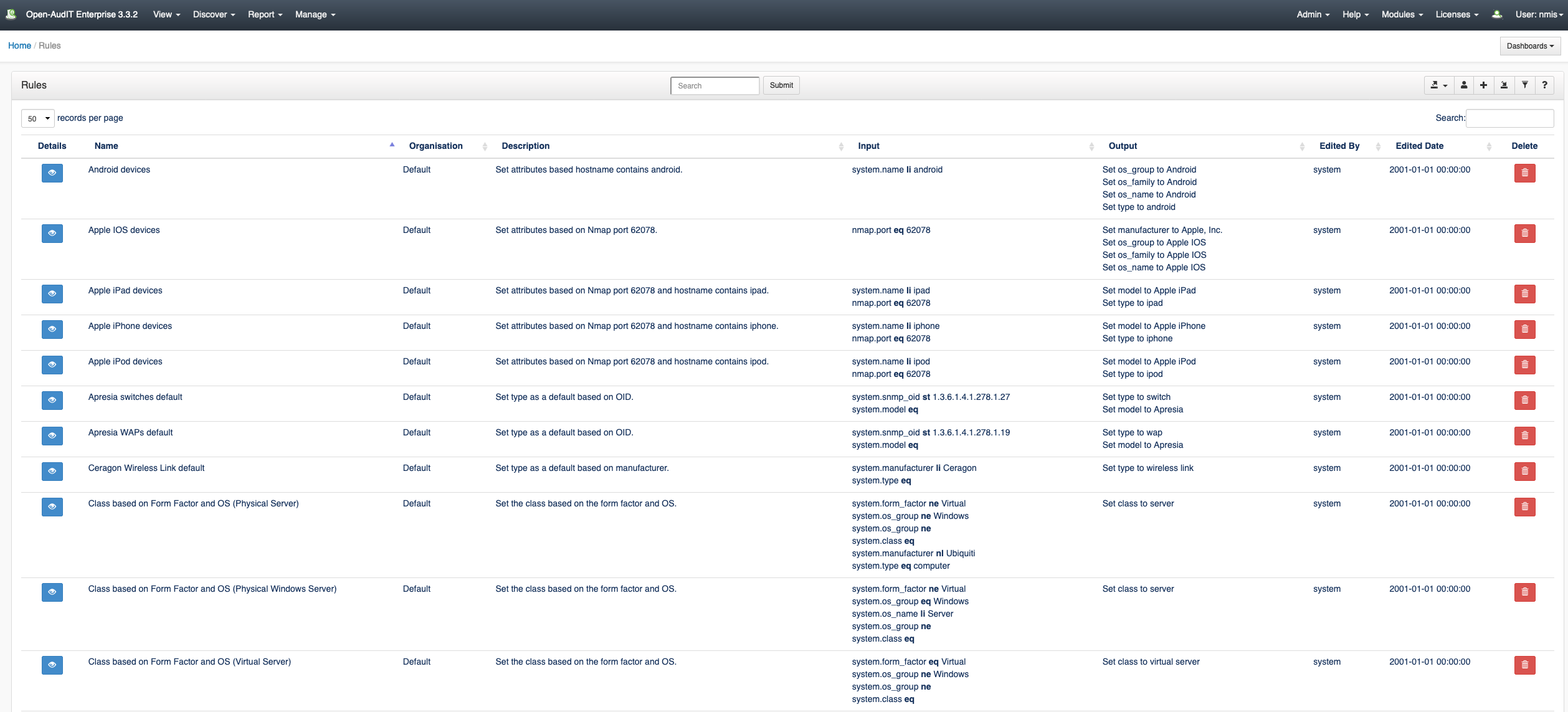...
For those curious, the "new" files that replace the Rules are:
| File | Description |
|---|---|
| /open-audit/code_igniter/application/helpers/mac_helper | Matches MAC addresses to manufacturers. |
| /open-audit/code_igniter/application/helpers/mac_model_helper | Matches Apple manufacturer codes to models (stored in system.manufacturer_code). |
| /open-audit/code_igniter/application/helpers/snmp_model_helper | Matches the device's SNMP OID to a model and type. |
| /open-audit/code_igniter/application/helpers/snmp_model_helper | Matches the devices's SNMP OID to the manufacturer. |
And of course you are free to add or modify the rules as you see fit. If you have a device with an SNMP OID that doesn't match a model already in the file - now you can add it easily. No more waiting for us to provide a patch and add it to the code base for you.
...
Because there are so many rules (near one hundred thousand), paging through them is unrealistic. We still retrieve the default number of entries as per the configuration item, however there is a search box at the top of the panel. Use this to search through the name, description, inputs and outputs to refine the list and find what you're looking for. There is also a button on the panel header that will show you all the rules you have created or edited. See below.
Database Schema
| Code Block | ||||
|---|---|---|---|---|
| ||||
CREATE TABLE `rules` (
`id` int(10) unsigned NOT NULL AUTO_INCREMENT,
`name` varchar(200) NOT NULL DEFAULT '',
`org_id` int(10) unsigned NOT NULL DEFAULT '1',
`description` text NOT NULL,
`weight` int(10) unsigned NOT NULL DEFAULT '100',
`inputs` text NOT NULL,
`outputs` text NOT NULL,
`edited_by` varchar(200) NOT NULL DEFAULT '',
`edited_date` datetime NOT NULL DEFAULT '2000-01-01 00:00:00',
PRIMARY KEY (`id`)
) ENGINE=InnoDB AUTO_INCREMENT=155875 DEFAULT CHARSET=utf8 |
Example Database Entry
| Code Block | ||||
|---|---|---|---|---|
| ||||
id: 65554
name: Mac Address for Cisco Systems
org_id: 1
description: Set the manufacturer based on the MAC prefix.
weight: 90
inputs: [{"table":"network","attribute":"mac","operator":"st","value":"cc:46:d6"},{"table":"system","attribute":"manufacturer","operator":"eq","value":""}]
outputs: [{"table":"system","attribute":"manufacturer","value":"Cisco Systems","value_type":"string"}]
edited_by: system
edited_date: 2001-01-01 00:00:00 |
API / Web Access?
...
The database schema can be found in the application is the user has database::read permission by going to menu: Admin -> Database -> List Tables, then clicking on the details button for the table.
API / Web Access
You can access the collection using the normal Open-AudIT JSON based API. Just like any other collection. Please
...
see The Open-AudIT API documentation for further details.
API Routes
...
Request Method
...
ID
...
Action
...
Resulting Function
...
URL Example
...
Notes
...
Example Response
...
Default Items
Shipped are a set of default items. These can be found by going to menu: Help → Defaults → Rules
...
Web Application Routes
Only available under Open-AudIT Enterprise
...
Request Method
...
ID
...
Action
...
Resulting Function
...
URL Example
...
Notes
...
.
